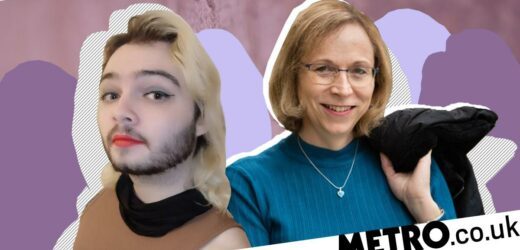Katie Neeves used to be close with her sister, but they haven’t had a relationship since parent-of-one Katie, 54, came out as trans at 48.
‘It’s a shame she can’t see how much happier I am,’ she says. ‘I didn’t do it to hurt her, I did it to be happy.’
Katie, who lives in Leicestershire, says the difference between her closest friends – aka her ‘chosen family’ – and her birth family is ‘like chalk and cheese’, and that coming out helped her find out who her ‘true friends are.’
While they may have slipped up with things like her pronouns at first (‘they were breaking the habits of a lifetime,’ says Katie), her friends accepted her much more quickly and easily than her family did.
And the trans community she’s found since coming out are naturally a great help to her too.
‘There’s a real understanding among trans friends,’ Katie, who runs the awareness and education organisation Cool 2B Trans, explains. ‘We’ve all suffered in some way – we’ve all been there.’
Therapist and Counselling Directory member Billie Dunlevy says that, while a chosen family is not just for people with a complicated home life, lots of people naturally move towards these kinds of bonds if they’ve been rejected in some way by their birth family.
‘In these cases the importance of a chosen family cannot be underestimated,’ says Billie.
‘We all need spaces where we feel held, understood, and loved just as we are.’
Billie argues that these kinds of bonds are usually deeper than a straight-up friendship in that they tend to last longer and provide more of a community.
‘Some friends are part of our lives for just a season,’ she explains, ‘but chosen family is often more consistent.
‘There tends to be certain things we might not feel is appropriate to share or go to a friend for support with. Whereas a chosen family sees people through life’s celebrations, as well as hardship, loss, and illness.’
https://www.instagram.com/p/CmBnwluA6vs/
JP Casey, 26, who’s non-binary and goes by Casey, says they’re ‘more invested’ in their chosen family than the one they were born into.
‘Personally,’ the London-based journalist tells us, ‘I’m not particularly close with my birth family because some of them don’t acknowledge my gender, which puts a limit on how close we can really be.
‘We can talk about “simple” things, such as my new job, or how our favourite sports teams are doing, but more important aspects of my identity – what I’m doing with my free time, who I’m dating, and so on – are just always off the table.’
For Samantha Marshall, meanwhile, her chosen family is ‘a safety blanket’.
‘They are just an extension of my blood family,’ she adds.
Samantha, who identifies as queer, counts herself lucky to have been born into a family full of people who ‘support and celebrate my life’, but it wasn’t always that way.
‘For them,’ the 24-year-old says, ‘it’s taken time to adapt their ways of thinking and just accept who I am.’
Entrepreneur Chad Teixeira, who’s gay and uses the pronouns he/him and they/them, says the empathetic and accepting bonds of chosen families in the queer community offer LGBTQ+ people something that’s often found sadly wanting in wider society.
They call this ‘a sanctuary’, adding: ‘It’s not about replacing what we were born into, but about expanding our notion of family to include those who truly understand and accept us as we are.’
Even though there are parts of his identity that he feels are better understood by his group of friends, Chad, 27, has a good relationship with his family too – these two things are not mutually exclusive.
‘It’s the best of both worlds, really,’ Londoner Chad tells us, ‘being embraced by two families – one that I was born into, and another that I chose for myself.’
‘Even the most accepting and curious family members may not be able to provide the deep connection and reflective experience that we get when surrounded by people who are like us in some way,’ says Billie.
‘Shared experiences are an important part of connection and feeling seen in the world.’
Do you have a story to share?
Get in touch by emailing [email protected].
Source: Read Full Article




